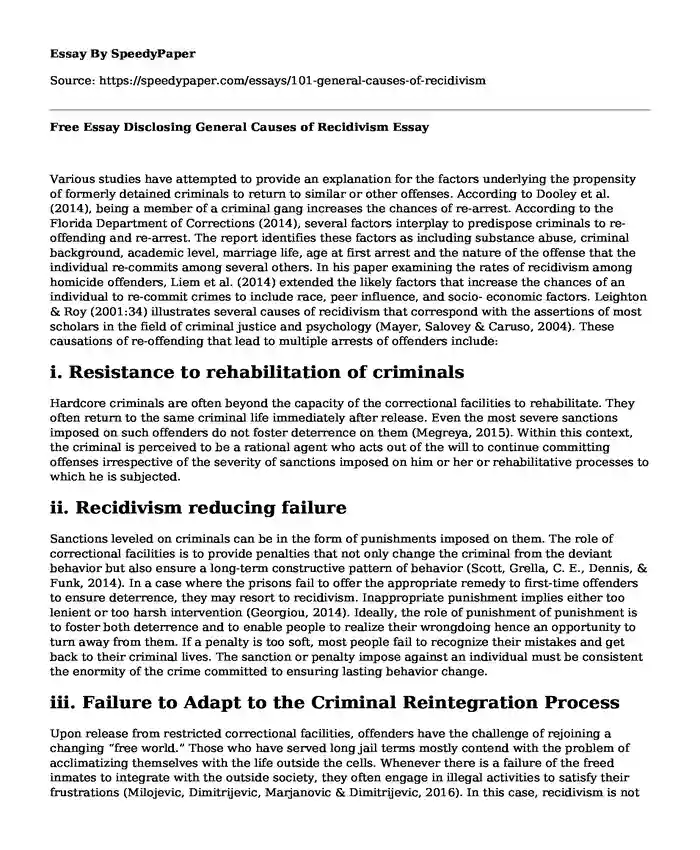
| Type of paper: | Essay |
| Categories: | Criminal law Penal system |
| Pages: | 3 |
| Wordcount: | 773 words |
Various studies have attempted to provide an explanation for the factors underlying the propensity of formerly detained criminals to return to similar or other offenses. According to Dooley et al. (2014), being a member of a criminal gang increases the chances of re-arrest. According to the Florida Department of Corrections (2014), several factors interplay to predispose criminals to re-offending and re-arrest. The report identifies these factors as including substance abuse, criminal background, academic level, marriage life, age at first arrest and the nature of the offense that the individual re-commits among several others. In his paper examining the rates of recidivism among homicide offenders, Liem et al. (2014) extended the likely factors that increase the chances of an individual to re-commit crimes to include race, peer influence, and socio- economic factors. Leighton & Roy (2001:34) illustrates several causes of recidivism that correspond with the assertions of most scholars in the field of criminal justice and psychology (Mayer, Salovey & Caruso, 2004). These causations of re-offending that lead to multiple arrests of offenders include:
i. Resistance to rehabilitation of criminals
Hardcore criminals are often beyond the capacity of the correctional facilities to rehabilitate. They often return to the same criminal life immediately after release. Even the most severe sanctions imposed on such offenders do not foster deterrence on them (Megreya, 2015). Within this context, the criminal is perceived to be a rational agent who acts out of the will to continue committing offenses irrespective of the severity of sanctions imposed on him or her or rehabilitative processes to which he is subjected.
ii. Recidivism reducing failure
Sanctions leveled on criminals can be in the form of punishments imposed on them. The role of correctional facilities is to provide penalties that not only change the criminal from the deviant behavior but also ensure a long-term constructive pattern of behavior (Scott, Grella, C. E., Dennis, & Funk, 2014). In a case where the prisons fail to offer the appropriate remedy to first-time offenders to ensure deterrence, they may resort to recidivism. Inappropriate punishment implies either too lenient or too harsh intervention (Georgiou, 2014). Ideally, the role of punishment of punishment is to foster both deterrence and to enable people to realize their wrongdoing hence an opportunity to turn away from them. If a penalty is too soft, most people fail to recognize their mistakes and get back to their criminal lives. The sanction or penalty impose against an individual must be consistent the enormity of the crime committed to ensuring lasting behavior change.
iii. Failure to Adapt to the Criminal Reintegration Process
Upon release from restricted correctional facilities, offenders have the challenge of rejoining a changing “free world.” Those who have served long jail terms mostly contend with the problem of acclimatizing themselves with the life outside the cells. Whenever there is a failure of the freed inmates to integrate with the outside society, they often engage in illegal activities to satisfy their frustrations (Milojevic, Dimitrijevic, Marjanovic & Dimitrijevic, 2016). In this case, recidivism is not internally induced but a result of the external factors inherent in the struggle to cope with reintegration problems and the infectiveness of existing social support systems for former detainees.
iv. Peer Influence and Other Forms of Social Provocations
The predisposition of former inmates to go back to criminal activities includes other external social factors. Even with the right sanctions, the willingness of the offenders to participate wholly in the behavior change program depends on a series of factors including peer pressure. For instance, offenders having a drug use history and put under drug rehabilitation program may find it difficult to embrace a drug-free life if his or her immediate friends and age mates pressurize him to engage in drugs (Georgiou, 2014). Therefore, recidivism in this end is a function of social stimulus, which is beyond the whims of the criminal justice system.
v. Criminal Economic Challenges
It is a natural human instinct to struggle for subsistence. This reality implies a consistent need for basic needs such as food, water, and shelter. In a case where an individual has trouble in obtaining any of these essential needs, they resort to illegal ways of getting them (Scott, Grella, C. E., Dennis, & Funk, 2014). In a similar way, when freed offenders find it strenuous to access their daily needs or if they feel disenfranchised from mainstream economic activities, they may re-engage in illegal acquisitions such as robbery with violence or illegal businesses including drug trafficking. In this instance, it is not the failure of programs or failure of the person to recognize his or her illegal dealings that led to an initial arrest but the inability to access means of survival.
Cite this page
Free Essay Disclosing General Causes of Recidivism. (2018, Mar 30). Retrieved from https://speedypaper.net/essays/101-general-causes-of-recidivism
Request Removal
If you are the original author of this essay and no longer wish to have it published on the SpeedyPaper website, please click below to request its removal:
- Population Growth Essay Example
- An Essay Sample about Ethics in Sports
- Is Art Useless? Check Out the Answer in This Free Essay
- Free Essay on Homeland Cyber Security
- Migration of Latino Groups into the United States, Essay Sample for You
- Hybridity in the Book Ceremony, Free Essay Sample
- Free Essay - Use of Business Intelligence in Healthcare
Popular categories




